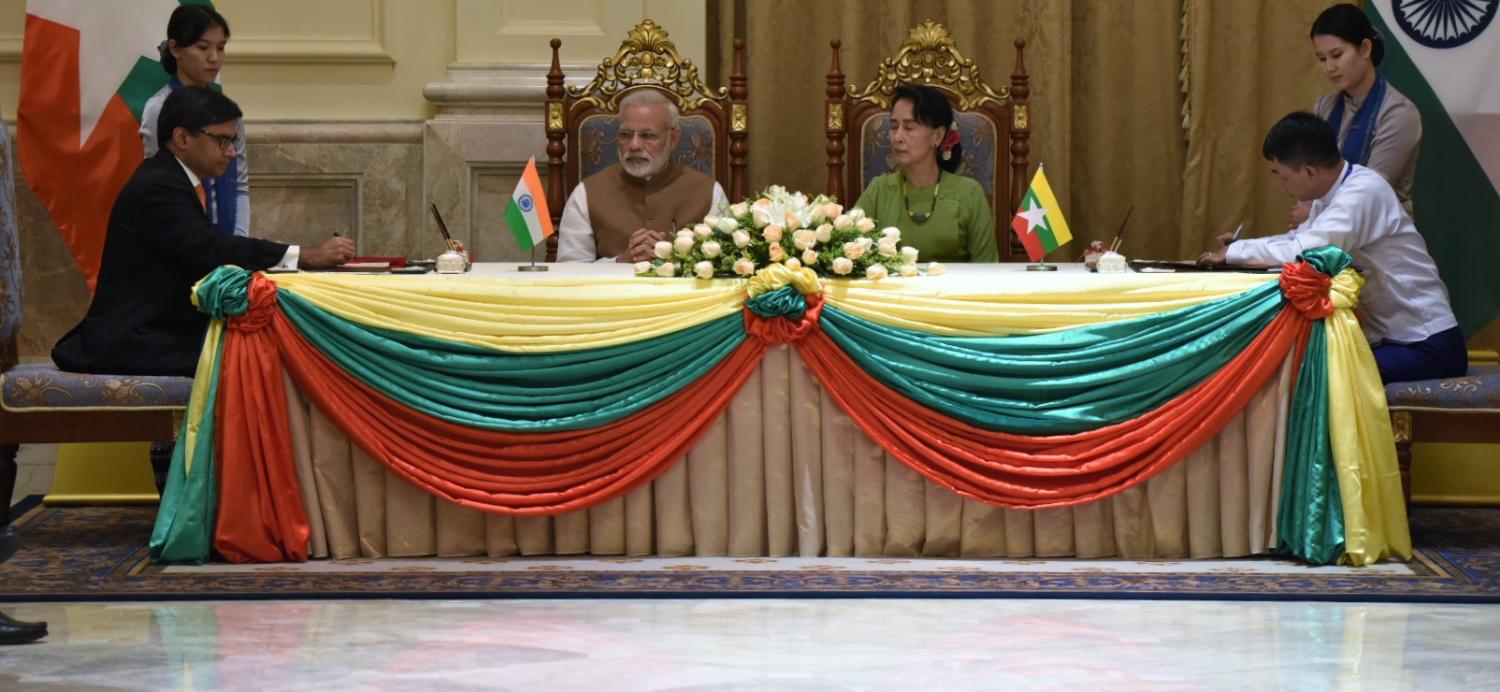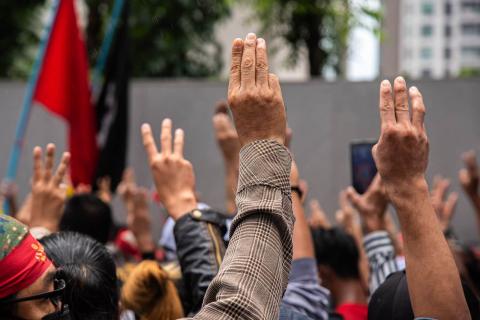India has scored a string of recent geopolitical victories in Asia: the alleged sale of the Brahmos supersonic cruise missile to Vietnam; a further deepening of the strategic relationship with Japan, marked by Prime Minister Shinzo Abe's visit to India; and the recent de-escalation of tensions with China in the Doklam plateau.
However, another development of equal strategic significance to India's regional ambitions is the role it plays in addressing the humanitarian crisis facing the Rohingyas of neighbouring Myanmar. Almost 400,000 have fled Rakhine state since late August in response to military operations that followed attacks by the Rohingya Arakan Salvation Army. The Indian government recently announced 'Operation Insaniyat' (translated as 'Operation Humanity'), which will provide humanitarian assistance to Bangladesh as it bears the brunt of refugee outflows. This announcement is reassuring, given that Prime Minister Narendra Modi's recent visit to Myanmar featured little discussion of the humanitarian crisis unfolding in the country and a refusal by India to admit any refugees.
Striking a balance
India faces moral obligations as a major power in the international system. This responsibility is sometimes overlooked in the context of the more frequently cited economic drivers of India's foreign policy (strengthening regional connectivity and attracting investment to improve India's infrastructure and manufacturing capacity) and its strategic objectives (maintaining a stable periphery and preventing the emergence of a Sino-centric regional or global order).
Undoubtedly India is aware of these obligations, as demonstrated by the humanitarian assistance it provided following natural disasters such as the Indian Ocean tsunami in December 2003 and Cyclone Nargis, which struck Myanmar in 2008. India also played a prominent role in the evacuation of civilians from conflict-ridden states such as Yemen in 2015, Libya in 2011 and Lebanon in 2006. However, as developments in Myanmar indicate, India can do more to strengthen its HADR (Humanitarian Assistance and Disaster Relief) credentials. Moreover, given Myanmar's geographic position on India's eastern border and as an overland gateway to East Asia, helping to address the humanitarian crisis in Myanmar is also pivotal to maintaining the credibility of India's 'Neighbourhood First', and 'Act East' policies.
To be sure, the government is likely to have been privately vocal in voicing its displeasure at developments in Rakhine state during Modi's visit (avoiding public embarrassment for Naypyidaw). This approach would conform to a proclivity for quiet diplomacy and non-intervention in regional interactions. India has also learned the lessons of its earlier engagement with Myanmar – New Delhi's vocal condemnation of the military junta regime after it brutally suppressed pro-democracy protests in 1988 and dismissed the results of the 1990 election undermined India's relations with Myanmar and pushed it into the arms of China.
There is also recognition of the precarious political climate facing Myanmar, with the democratic transition process still in its infancy. This has resulted in a division of responsibilities between the civilian government led by Aung San Suu Kyi (officially State Counsellor and Foreign Minister, but effectively the head of state in the face of constitutional restrictions preventing her from assuming the presidency) and the Tatamdaw (military) that continues to hold onto the portfolios of defence, home affairs and border affairs, in addition to a quarter of parliamentary seats and a majority of seats in the powerful National Defence and Security Council. In this context, public condemnation of Suu Kyi's government would have yielded little benefit while potentially exacerbating fissures between the civilian government and military.
Nonetheless, New Delhi's interests in Myanmar extend beyond clamping down on sanctuaries for separatist groups in the northeast, strengthening regional infrastructure connectivity, and counter-balancing China's influence in the country. India has a responsibility as a major regional power and state sharing a 1600km border with Myanmar - and as the world's largest democracy - to ensure that Myanmar's democratic transition is sustainable and facilitates the emergence of a stable and prosperous country that respects the rights of its population, including its ethnic and religious minorities. This entails resisting the radical Buddhist nationalism propagated by such groups as Ma Ba Tha (Association for the Protection of Race and Religion), which has contributed to discriminatory legislation. The extent to which India and like-minded countries in ASEAN and the broader region support Myanmar's democratic transition process may be a deciding factor in the path Myanmar takes – will it follow a path similar to Indonesia (where the democratic transition process has allowed the military to gradually step back from the political sphere) or to Thailand and Pakistan (which continue to oscillate between weak civilian governments and military rule)?
Reviving the 'arc of democracies'
Beyond India, responding to the humanitarian crisis in Myanmar presents a test for the region's like-minded countries. Recently, there has been discussion of reviving a short-lived initiative, initially called the Quad but also known as the 'democratic security diamond', comprising Australia, India, Japan and the United States. While much of the rhetoric concerning this initiative focused on challenging China's increasingly assertive behaviour (as evidenced by the 2007 Malabar joint naval exercises), the grouping is also concerned more broadly with upholding the principles of democracy, human rights and the rule of law. Developments in Myanmar present a test case for consolidating this so-called 'arc of democracies', as does the suppression of the political opposition in Cambodia ahead of the country's parliamentary elections in July 2018; Thailand's long-delayed reversion to democratic rule following the military coup in 2014; and extra-judicial killings in the Philippines under the government of President Rodrigo Duterte. Addressing these developments would also fill a perceived void created by President Donald Trump's 'America first' foreign policy, which has placed more emphasis on transactional diplomacy over value-driven diplomacy.
Reclaiming former glory
Ultimately, burnishing its humanitarian credentials offers India an opportunity to distinguish itself from other regional powers. Doing so would allow the country reclaim the short-lived status it acquired after independence, when Prime Minister Jawaharlal Nehru emerged as a vocal proponent of anti-colonialism and anti-imperialism. This status was reinforced by the Bandung Conference of 1955 and subsequent Non-Alignment Movement, as well as India's participation in the Eighteen Nations Conference convened in January 1949 to voice opposition to Dutch 'Police Action' in Indonesia; India's mediating role during the Korean War through chairmanship of the Neutral Nations Repatriation Commission; and chairmanship of the International Control Commission on Indochina following the end of the Indochina War in 1954.
Reaffirming the moral elements of India's foreign policy would also offer the country the opportunity to play on its strengths – while it's unlikely to achieve economic parity with China or military parity with the United States anytime soon, India can nonetheless leverage its soft power status as the world's largest democracy.

